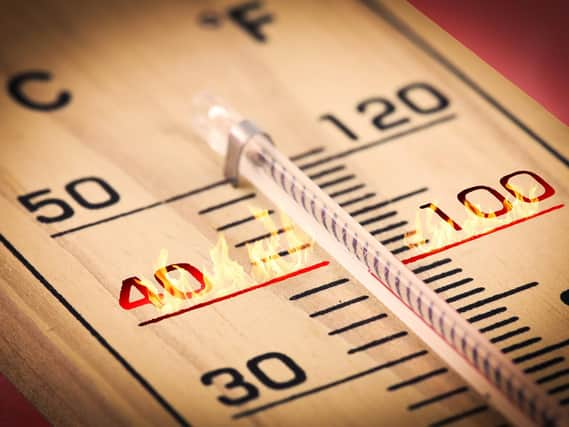Regular heatwaves could kill thousands of people every year in the UK


While some love the sunshine, MPs are warning that regular heatwaves could cause heat-related deaths to treble by 2050 unless the Government acts fast.
38.5C summers by 2040 Failing to address the danger of heatwaves will threaten the well-being of an increasing number of vulnerable people, a recent report from the Environmental Audit Committee has found.
Advertisement
Hide AdAdvertisement
Hide Ad“Heatwave warnings are welcomed as barbecue alerts, but they threaten health, wellbeing and productivity,” said Mary Creagh MP, Chair of the Environmental Audit Committee.


“The Met Office has projected that UK summer temperatures could regularly reach 38.5C by the 2040s.
“The Government must stop playing pass the parcel with local councils and the NHS and develop a strategy to protect our ageing population from this increasing risk”
Why is a heatwave a problem?
Heatwaves can cause a multitude of health problems including:


-Dehydration
Advertisement
Hide AdAdvertisement
Hide Ad-Overheating, which can make symptoms worse for people who already have problems with their heart or breathing
-Heat exhaustion and heatstroke
-Premature deaths from cardiac, kidney and respiratory disease
The Committee reported that there will be 7,000 heat-related deaths every year in the UK by 2050 if action is not taken.
Who is most at risk?
A heatwave can affect anyone, but according to the NHS the most vulnerable people include:
-Older people, especially those over 75
-Babies and young children
Advertisement
Hide AdAdvertisement
Hide Ad-People with a serious chronic condition, especially heart or breathing problems
-People with mobility problems. For example, people with Parkinson’s disease or who have had a stroke
-People with serious mental health problems
-People on certain medications, including those that affect sweating and temperature control
-People who misuse alcohol or drugs
-People who are physically active. For example, labourers or those taking part in sport
Heatwaves and the NHS
Advertisement
Hide AdAdvertisement
Hide AdThe Environmental Audit Committee’s report determined that heatwaves place strain on the NHS and social care system.
During the 2013 heatwave, double the number of consultations for heat-related illness took place, compared to a non-heatwave year.
During the 2003 heatwave, excess deaths in nursing homes in parts of the UK rose by 42 per cent.
MPs now want hospitals and care homes inspected in order to check that they can cope with scorching temperatures.
Advertisement
Hide AdAdvertisement
Hide AdThe Committee has called on the Government to ensure that NHS England issues guidance on planning for summer pressures.
This should make sure that adequate steps are taken to prepare the NHS for more frequent heatwaves. As part of this move, NHS organisations should submit annual heatwave plans to ensure they are prepared for any sudden onset of warm weather.
Do heatwaves impact the rest of the UK public?
Elderly and unwell people are not the only ones who would be affected by an increase in spells of warm weather. Heatwaves can cause railway tracks to buckle and roads to melt, affecting transport across the board.
Only 50 per cent of the UK’s motorways and major roads are surfaced with material that can sufficiently cope with the kind of high temperatures that the UK has experienced lately, the new report found.
Advertisement
Hide AdAdvertisement
Hide AdLast month, railway tracks buckled, causing significant delays, either because trains could not operate or because they had to be run at a slow speed to avoid damage.
This means that passengers sometimes have to endure rail journeys in uncomfortably hot carriages. What’s more, once commuters get to work, there are no regulations currently in place in to police maximum workplace temperatures.
The Committee is calling on the Government to make businesses aware of the developing threat of heatwaves. They also want Public Health England to issue formal guidance to employers regarding relaxing dress codes and allowing flexible working when heatwave alerts are issued.
On top of this, there are calls for the Department for Education to issue guidance for head teachers about safe temperatures in schools and relaxing school uniform policy during hot weather.
Read more at: https://www.yorkshireeveningpost.co.uk/read-this/regular-heatwaves-kill-thousands-uk/